Mental health issues are difficult to diagnose. Not only are there many different types of mental diseases, but they frequently have common and overlapping symptoms. An elderly person who is suffering from a mental health issue deserves a proper diagnosis. Only when the condition is fully understood will they be able to get the treatment that they need and deserve.
Through accessing EEOICPA and RECA benefits, qualified applicants may be entitled to receive no-cost home health services that are narrowly tailored to treat their specific condition. Here, we review eight of the most common types of mental health issues and neurological conditions that affect American seniors.
1. Dementia
As explained by the National Institute on Aging, dementia is a term that is used to describe the generalized loss of cognitive functioning and behavioral abilities. From memory and language skills to problem-solving and emotional regulation, dementia impacts virtually every aspect of a person’s life. Early intervention is one of the keys to effectively managing this condition.
2. Alzheimer’s Disease
Approximately 5 million Americans are living with Alzheimer’s disease. As described by the Mayo Clinic, Alzheimer’s disease is a disorder that results in brain cells gradually degrading and wasting away. It is a condition that progressively gets worse. While there is currently no cure for Alzheimer’s, there are many different treatment programs available to manage and mitigate the condition.
3. A Comparative Analysis Between Dementia and Alzheimer’s Disease
Although the terms are frequently confused, dementia and Alzheimer’s disease are not synonyms. Alzheimer’s is essentially one type of dementia. It is a specific medical condition. In contrast, dementia does not refer to a single specific ‘disease’. Instead, it is an umbrella term that is used to describe a set of common symptoms.
4. Anxiety
Anxiety among the elderly is a serious public health problem. By some measures, nearly one in six American seniors are living with an anxiety disorder. The good news is that with the proper support services, many of those who are suffering from anxiety will see a dramatic improvement in their quality of life.
5. Social Phobia
It is not uncommon for older adults to develop severe social phobias. In fact, this type of condition affects people who may never have previously experienced any prior social issues when they were younger. Notably, social phobias can sometimes be a symptom of other, underlying mental health issues.
6. Bipolar Disorder
As defined by the National Institute of Mental Health, bipolar disorder is a mental health issue that causes unusual shifts in a person’s mood and in their energy levels. It is sometimes referred to as “manic-depressive” illness. If your elderly loved one is showing signs of bipolar disorder, you should contact a qualified medical professional right away.
7. Eating Disorders
Although eating disorders are often associated with teenagers, they are actually more commonly diagnosed in elderly people. For a number of different reasons, seniors may develop issues with eating — it could be the sign of another mental health issue, such as depression or anxiety, or it could be a symptom of a physical problem, such as nausea. Regardless, immediate treatment is always required. The risk of malnutrition is high.
8. Schizophrenia
Schizophrenia is a chronic and severe mental health condition that affects both thinking and behavior. Contrary to what many people believe, it is possible for patients to develop late-onset schizophrenia. Your elderly loved one may be suffering from Schizophrenia even if they never dealt with the condition before.
Who We Serve
Do you have this card?

If you already have this card, then you are already approved to receive no-cost medical benefits! Call us to get started today.
In order to be eligible for EEOICPA/RECA benefits, an individual must have been employed at a covered Department of Energy facility, an approved atomic weapons facility, or at a permitted beryllium vendor. An individual must also have one of the covered conditions as a result of exposure to radiation, beryllium, or silica while employed at an accepted facility. In addition, uranium miners, millers, and ore transporters are eligible for benefits if they develop an illness as a result of exposure to toxic substances (such as radiation, chemicals, solvents, acids, and metals) and worked at a facility covered under RECA. Eligibility requirements vary by location and condition.